A good number of years ago I met Richard Wurmbrand, the faithful Romanian Christian who had been so brutally tortured in a communist jail. He had a body worn from age and abuse but glowing eyes and bit of surprising whimsy. He was getting handshakes from admiring North Americans (most evangelicals know his book Tortured for Christ and his work with Voice of the Martyrs) and when I approached him he grumbled that there must be something wrong with Americans. ” Don’t you know your Bibles?”, he wondered. For some odd reason, I knew what he meant, and skipped the secular handshake and went in for a holy kiss (Romans 16:16, 2 Corinthians 13:12.) Ahh, that was more like it. A fun story, but what most touched me was that I was in the presence of a man who had faced years of imprisonment and torture.
Around that time I was lobbying to cut off U.S. military aid to brutal regimes in Central America. Ollie North was lying up a storm and Pat Robertson was helping buy helicopters that shot down at villagers from the sky. I hosted an evening with a missionary who had known the martyred Archbishop Oscar Romero; my friend had witnessed the massacre of those who had come to vigil at Romero’s funeral and gave me a handmade cross with the name of a tortured Salvadoran peasant which he had carried at that blood-soaked protest.
Two men who had suffered, who knew first hand those who had been killed for their faith. Wurmbrand, of course despised communists. Romero was (wrongly) called a communist and gunned down by US-trained Salvadoran paramilitary police for his advocacy for social democracy. Both bring into clarity the horror of governments gone cruel.
Nowadays, it seems, the harshest threat to human freedom and the most common ideology carrying out vigilant violence, torture, beheadings, executions, public whippings, arrests despite dubious charges, and such is found in nations influenced by radical Islam. Of course most Muslims are not torturers, just like most common Christians in the Middle Ages were not crusaders, but there is no doubt that the influence of Islamic fundamentalism has caused not only terrorism of the sort we experienced on 9-11 but increasing political repression in countries around the globe. (I heard just the other day of a woman in Saudi Arabia sentenced to lashings for breaking the prohibition against women driving cars!) A month ago I reviewed the remarkable book by Lee Camp, Who Is My Enemy: Questions American Christians Must Face About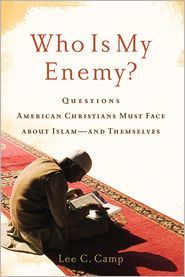
Just this week there has been (most on the internet) news about Youcef Nadarkhani, a convert to Christianity from Islam who had been arrested in Rasht, Iran. He was given in court the traditional three opportunities to deny his Christian faith and he refused, knowing that this is a crime punishable by death.
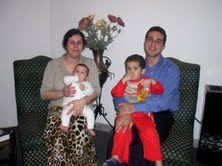 Many international leaders have renounced this awful violation of human conscience—executing someone merely because of what they believe!—-and yet it wasn’t until just a few days ago that the White House issued a protest. (Why Ms Clinton’s yelping about somebody throwing rotten tomatoes at a diplomatic limo seemed a more urgent story for the media this week is beyond me.) We should pray for our brother in Christ, and all those of any faith, or no faith, who are being persecuted for the sheer fact that they hold to a particular religious or philosophical conviction. Religious freedom should be a bed-rock, non-negotiable right. The greatest threat to religious freedom in nearly every continent today is radical Islam.
Many international leaders have renounced this awful violation of human conscience—executing someone merely because of what they believe!—-and yet it wasn’t until just a few days ago that the White House issued a protest. (Why Ms Clinton’s yelping about somebody throwing rotten tomatoes at a diplomatic limo seemed a more urgent story for the media this week is beyond me.) We should pray for our brother in Christ, and all those of any faith, or no faith, who are being persecuted for the sheer fact that they hold to a particular religious or philosophical conviction. Religious freedom should be a bed-rock, non-negotiable right. The greatest threat to religious freedom in nearly every continent today is radical Islam.
Two of the activist/scholars who have been faithful in reporting about this heavy issue generally, and Mr. Nadarkhani’s plight, specifically, have been Nina Shea and Paul Marshall of the Hudson Institute’s Center for Religious Freedom. Along with their multi-faithed staff of Senior Fellows they have been documenting global religious discrimination and persecution for decades, now. They have done on-the-ground research, bravely traveling to places like the Sudan, researching religious persecution in Malaysia, or observing local elections or battles in Nigeria. From Iran to Yemen to Pakistan, they have been observant, eager learners, nurturing where they can the principles of liberty, dignity, and, when appropriate, have encouraged the the the local voices who are passionate critics of injustice. To say that they are reputable and know what they are doing is an understatement.
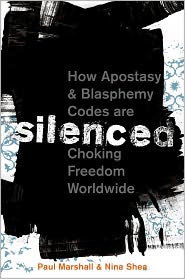 Their long-awaited book, Silenced: How Apostasy & Blasphemy Codes Are Choking Freedom Worldwide (Oxford University Press; $35.00) was just released by the leading global scholarly press and it is extraordinary for several reasons. Knowing what they are writing about and knowing how they have tirelessly researched this gruesome stuff, I feel honored to even be holding the fruit of their efforts. I am not qualified to do the book justice but I can say that it is very, very important, will be taken seriously by global thinkers, writers, activists and politicians, and—or so it seems to me—will be noticed even by Al Qaeda and their supporters.
Their long-awaited book, Silenced: How Apostasy & Blasphemy Codes Are Choking Freedom Worldwide (Oxford University Press; $35.00) was just released by the leading global scholarly press and it is extraordinary for several reasons. Knowing what they are writing about and knowing how they have tirelessly researched this gruesome stuff, I feel honored to even be holding the fruit of their efforts. I am not qualified to do the book justice but I can say that it is very, very important, will be taken seriously by global thinkers, writers, activists and politicians, and—or so it seems to me—will be noticed even by Al Qaeda and their supporters.
I once asked Paul, as we discussed the research he was doing for the book if he was worried about a fatwa against him or if he had any fears for his safety. He shrugged it off, but we were having drinks and a good time. I cannot imagine that he and his colleagues are not thinking that they may find themselves in the vulnerable situation that they document when they write about the fate of the Danish cartoonists or Theo Van Gogh and others who have been attacked by Muslim extremists. He joked that he was more concerned about the cheap charges of being Islamo-phobic that he will get from the left. That concerns him, naturally, as the left has historically been strong on human rights and freedom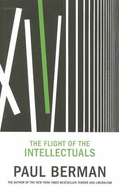 of conscious, but seems mostly absent in this struggle (see Paul Berman’s The Flight of t
of conscious, but seems mostly absent in this struggle (see Paul Berman’s The Flight of t
he Intellectuals: The Controversy Over Islamism and the Press [Melville House; $16.95.]) Besides, Marshall has many colleagues and friends who are devout Muslims, so the charge is ridiculous. The forward to Silenced is written by the late former President of Indonesia (the world’s largest Muslim country), Kyai Haji Abdurrahman Wahid, who was, before his death, the President of the world’s largest Islamic organization. He was a good man, an advocate for minorities in his homeland (even having housed Christian students in his palace when their university was burned) and he was a personal friend of Marshall’s, who visited with him from time to time. Islamo-phobic? Nonsense!
And so, Silenced may be attacked by conservative Muslims or it may be snooted at by liberals who seem to think any criticism against Islam’s dark side is of the same caliber as those of the nuts who burn Qurans. But it is a fully respectable and respectful work, competent, well-informed, even if a bit complex at times. It is morally and politically serious. It is not for the faint of heart. It will be read widely, I am confident. I cannot overstate how important it is.
As the subtitle shows, Silenced is a study of the apostasy laws and blasphemy codes within certain interpretations of Islam that would enact strict and often violent penalties (sometimes execution) for Muslims who leave the faith or for anyone who has insulted the faith. There is a bit of history of the development of these notions but the book is mostly a study of where these laws are being introduced, who is suffering because of them, and whether there are reasonable hopes for more just views of freedom of conscience to be enacted given the factions of radical Islam at play in those regions. In that sense, the book is more than just a warning about sharia law or a catalog of those being repressed by radical Islamic rules, but it is a study of the role of religion in geo-politics—explaining where Al Quida and other such groups, like the infamous Boko Haram (which roughly means “Western civilization is forbidden”), Al Shabab, The Muslim Brotherhood, and the like are operative. There is much to understand about Sunnis and Shiites and Wahhabi sects and who the grand muftis are and what United Nations Hate Speech resolutions are (etc. etc.) and our authors know their material well. They explain where clan or tribe loyalties come into play, explain who the moderate influences are, nation by nation, and offer insight about how the United Nations and other international groups may have mediating influences. The understand the complications of varying religious sects and they appreciate how these movements do or do not involve themselves in political actions. (May of the most persecuted, like the Baha’i, say, are utterly peaceful.)
Some of the stories they tell are horrific. The ones in the third world, the Middle East and Africa are the worst. But they also explain how the attacks against those would would “defame” Islam occurs in the West—a trend most obviously seen in incidences such as the fatwa against Salman Rushdie (and the self-censorship of Barnes & Noble who refused to stock his book), the brutal stabbing of Theo Van Gogh in Holland, the case of the Dutch MP, Geert Wilders, and the death threats against the now-famous memoirist, Somali-born, ex-Muslim, Ayaan Hirsi Ali.
They write,
The West still remains a relative haven for free debate, for voices of Islamic reform, and for those with unorthodox views of Islam. But Western states and international organizations stand at a crossroads between robust defense of free speech and a flaccid response to the persistent encroachment of anti-blasphemy restriction outside the reach of law by radical vigilantes.
Are punishments for non-conformity to radical Islamic views essential for an Orthodox devotion to Islam? This book draws on the writings of key Islamic scholars and sheiks and princes and the conclusion is ambiguous. They argue for toleration and pluralism and try to show ways the West can support pro-democratic, modernizing and moderate Islamic movements. Still, this intellectual battle will not be simple and understandings about freedom, religion and justice within even the moderate Muslim community are often conflicted. For instance, they note that a popular Islamic chaplain for students at Harvard University (of all places!) has written that we ought not too quickly critique the imposition of sharia law. They cite Sheikh Qaradawi, who they say is “perhaps the most widely consulted Islamic authority for the West” noting how he equivocates on the issue.
 Silenced makes a major contribution, also, by inviting three highly respected Islamic scholars to address this issue, which they did in three original essays included in the book. Of their guest contributors they write, “As committed Muslims, they are known for respect for Islam and they certainly deplore and oppose insults to God and to their religion. But, they argue carefully and strenuously that Islam does not require temporal punishment for blasphemy or apostasy.” One would hope serious Islamic scholars would read these essays carefully and promote them throughout the world.
Silenced makes a major contribution, also, by inviting three highly respected Islamic scholars to address this issue, which they did in three original essays included in the book. Of their guest contributors they write, “As committed Muslims, they are known for respect for Islam and they certainly deplore and oppose insults to God and to their religion. But, they argue carefully and strenuously that Islam does not require temporal punishment for blasphemy or apostasy.” One would hope serious Islamic scholars would read these essays carefully and promote them throughout the world.
I suppose you realize the significance of all this. Not only are Christians, and others (including moderate or pro-democratic Muslims) being persecuted in record numbers—why the press misses this is itself another story—but the West’s lax response seems only to strengthen the resolve of those who would make freedom of thought a crime. This problem is surely going to get worse in the next decade. As complex as international law and global resolutions and human rights campaigns are, they are significant and our voices are needed. This books teaches us much and helps explain the globalization of radical Islam, the internationalization of blasphemy codes, and the repressive reach of those who want to persecute others based on religious faith, even in the West. (They discuss the infamous case of Mark Steyn, charged along with the Macleans magazine in Canada for hate speech and an evangelical ministry in Australia who has been charged with the crime of vilification for preaching fairly common Christian views of the errors of Islam.)
Some of this, they show, seems nearly unbelievable. You may have heard of the case when a foreign aid worker, running a helpful school for children in Sudan, brought to class a stuffed toy teddy bear and allowed a vote for the children to name the bear. 20 out of 23 children voted to name the bear Muhammad, a popular name in that region, and, as it turns out, the name of a popular boy in the class.
The British teacher (Gillian Gibbons), they tell us,
was arrested for insulting Islam’s prophet, and, on November 28, she was formally charged under section 125 of the criminal law for insulting religion and inciting hatred. On November 29, she was found guilty of insulting religion and sentenced to fifteen days in prison followed by deportation. The following day, tens of thousands of protestors flooded the streets of Khartoum demanding her death for blasphemy. During the march, the protestors chanted “Shame, shame on the U.K.,” “No tolerance—execution” and “Kill her, kill her by firing squad.” Many protestors wielded machetes and swords, and government employees were involved in inciting the protests.
But that is small potatoes for the Sudan. One of the uses of blasphemy and apostasy by Sudan radicals is more brutal; you certainly have heard of the crisis in Darfur. You know ab
out the terrible civil war there, most likely have heard of the Sudan People’s Liberation Army, and militia that became the infamous Popular Defense Force. In 1992 “the Kordofan government declared jihad on the Nuba (people), and, in 1993, six government-sponsored Muslim clerics declared the Muslim insurgents apostates, who should be killed along with the nonbelievers who stood in the way of Islam. Hence, half a million people were sentenced to death.”
Almost any page of this revealing book has fascinating stories, important geo-political background, and helpful information for those of us who frankly haven’t kept up with this aspect of contemporary global reality. Some of it is tragic, some of it is graphic, much is truly outrageous. They are nuanced and careful in their reporting and their analysis. Again, there are gruesome stories, heart-breaking drama, and reports of complicated inter-Islamic debates, factions and feuds. From Pakistan and Iran to Somalia and Sudan, to Indonesia and Malaysia, there is much strife, much to know about, and this book is a learned resource that will be the definitive guide for years to come. As we show interest in the Arab Spring uprisings, this book will provide helpful background information on participating organizations, individuals, and document the track record of various countries on questions of freedom of conscious.
In case you were wondering, this is not a sensationalistic diatribe against Islam nor is it a partisan volley of support for Western imperialism. It is not shrill and it is not simplistic. But it does not whitewash matters, either. It strikes me as impeccably fair. The authors have many, many Islamic friends and colleagues, several who helped with the research and analysis; unlike some TV preachers railing against the terrorists, the book has a scholarly tone. It is quite thorough with over one hundred pages of documenting footnotes.
The people they thank reads like a United Nations roster, with names that sound like they are from every tribe and people group under heaven. Several are Western thought leaders, religious scholars, or diplomats, from the late Samuel Huntingdon and Bernard Lewis to Philip Jenkins and Lamin Sanneh, to the honorable Thomas Farr and R. James Woolsey, the former United States Director of the CIA. (Woolsey, by the way, writes that Silenced is “eloquent and definitive.”) The ethnic and religious diversity of those who have contributed to their project is amazingly rich, which, of course, indicates not only something about the cosmopolitan nature of the authors but the credibility of the text.
It is doubtless that Silenced: How Apostasy & Blasphemy Codes Are Choking Freedom Worldwide will be properly considered a magisterial work (and I happen to know they cut hundreds of pages out to make it passable as one volume.) It is painstakingly documented and carries both passion and wisdom. I know I’m a bit of geek to say this, but it seems like many of the over 100 pages of footnotes themselves carry remarkable side-stories, the further notes fleshing out in detail things claimed in the text. Studying their wild array of sources and international citations is a book in itself! To put it bluntly, when you shell out for this big book you are getting your money’s worth with tons of information, inspired stories, and important facts placed in a valuable context.
Marshall has previously written in more theoretical fields, reflecting on the nature of law, the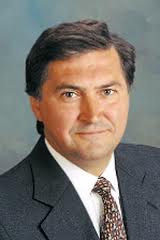 meaning of justice and jurisprudence, and how various worldviews and narratives shape different ways in which human rights are understood. (He wrote one of my all-time favorite books, which we still promote, called Heaven Is Not My Home: Living in the Now of God’s Creation; Nelson; $17.95.) His book God and the Constitution: Christianity and American Politics
meaning of justice and jurisprudence, and how various worldviews and narratives shape different ways in which human rights are understood. (He wrote one of my all-time favorite books, which we still promote, called Heaven Is Not My Home: Living in the Now of God’s Creation; Nelson; $17.95.) His book God and the Constitution: Christianity and American Politics
(Rowman & Littlefield; $30.95) is a thoughtful and accessible
introduction to a uniquely Christian perspective on statecraft, drawing
on the strengths of the Dutch neo-Calvinist views of principled
pluralism. He edited an academic volume called Radical Islam Rules and had a small introduction to Islam entitled Islam at the Crossroads. He has published monographs on detailed topics such as “The Talibanization of Nigeria.” His first popular-level book (now out of print) was Their Blood Cries Out which played a significant role in putting anti-Christian persecution on the radar of secular human rights activists who seemed to misunderstand the way in which repressive religions cause much injustice in the global south, especially. In subsequent years he has traveled the world, reporting on unjust treatment of the Coptic 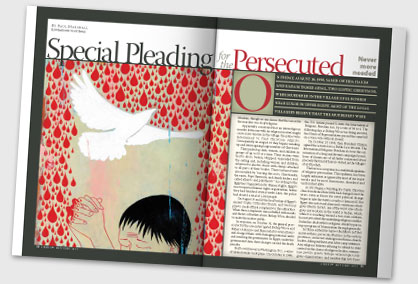 Christians in Egypt and other troubled spots. He has testified before Congress and lectured at the State Department. These previous books and essays—the scholarly work on a Christian philosophy of justice and rights and worldview, the work on Christian views of the government, and the human-rights reporting about religious persecution—all prepared him to undertake this massive, stressful work. Nina Shea is the Director of the Center for Religious Freedom and deserves equal credit as researcher, writer, and reporter. Her work is nearly unparalleled in this field. Here popular-level book, In the Lions Den (now out of print) was a gruesome but needed collection of first hand accounts of persecution and repression. In this new book Silenced, Marshall and Shea have given us a truly remarkable resource. Lives may be saved because of it. More just policies may be created. Greater tolerance and pluralistic civil societies may be supported. Let us hope this book and the struggle it documents, makes the world a better place.
Christians in Egypt and other troubled spots. He has testified before Congress and lectured at the State Department. These previous books and essays—the scholarly work on a Christian philosophy of justice and rights and worldview, the work on Christian views of the government, and the human-rights reporting about religious persecution—all prepared him to undertake this massive, stressful work. Nina Shea is the Director of the Center for Religious Freedom and deserves equal credit as researcher, writer, and reporter. Her work is nearly unparalleled in this field. Here popular-level book, In the Lions Den (now out of print) was a gruesome but needed collection of first hand accounts of persecution and repression. In this new book Silenced, Marshall and Shea have given us a truly remarkable resource. Lives may be saved because of it. More just policies may be created. Greater tolerance and pluralistic civil societies may be supported. Let us hope this book and the struggle it documents, makes the world a better place.
Whether you buy the book from us or not, whisper a prayer for the safety of the authors and their families. Exposing the brutal tyranny of some radical Islamists who have penchant for revenge and who can incite violence for things as seemingly inconsequential as showing school children posters of “The Three Little Pigs” or naming a teddy bear Muhammad, must be unnerving. Thank God for their courage, dedication to justice and their profound insight about human rights and religious freedom. Why not send information about Silenced to your congresspersons? It is the sort of thing we need to know about. Thanks for caring.
SPECIAL
DISCOUNT
any book mentioned above
2O% off
order here
takes you to the secure Hearts & Minds order form page
inquire here
if you have questions or need more information
Hearts & Minds 234 East Main Street Dallastown, PA 17313 717-246-3333
.

Thanks for making known this book about the freedom killing, murderous blasphemy codes! Such religion is despicable. We need courageous people of faith to stand up to this.